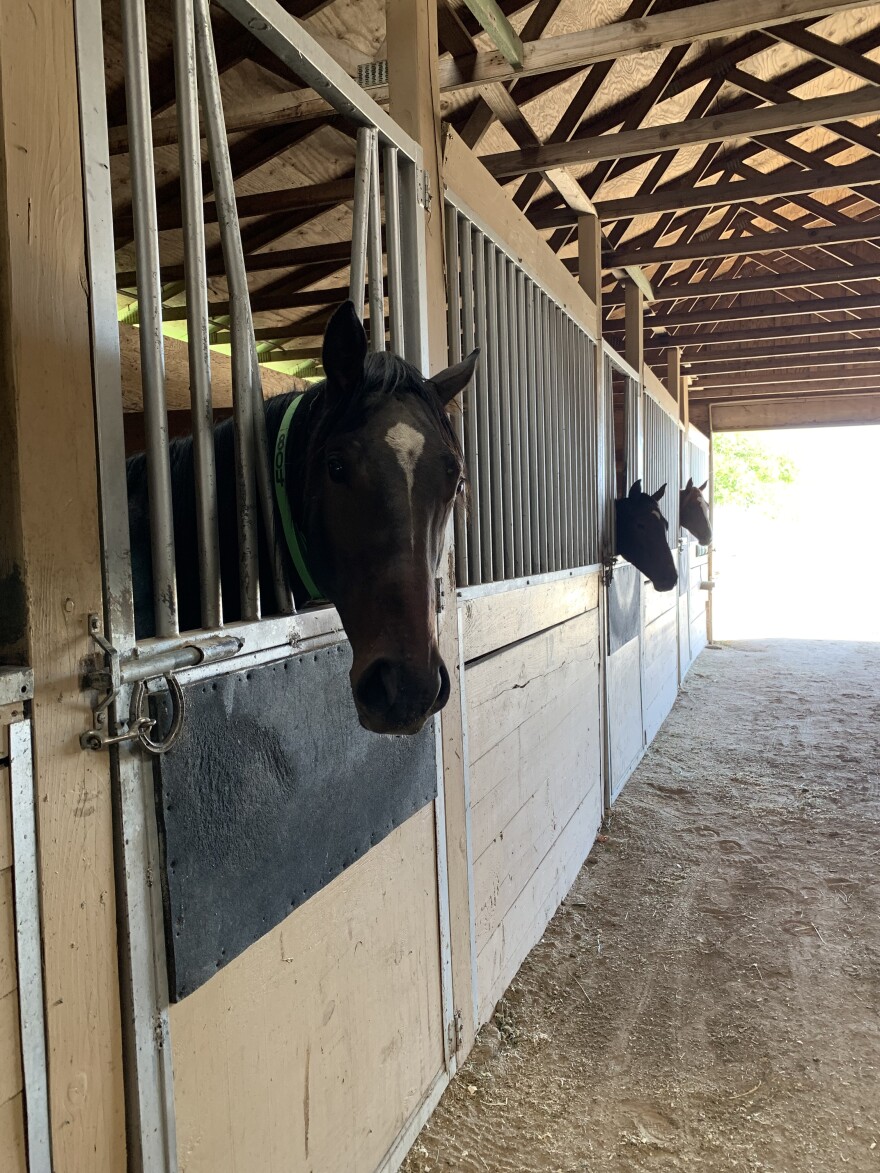If there’s one thing Leland Decker will teach you, it’s this. People who love to be around horses, they really love to be around horses. There’s no gray area.
“My work is horses, my spare time is horses, my hobby is horses,” he says.
His vacation is horses.
“I don’t have a boat. I don’t have a camper. I don’t play golf. I don’t play tennis. I don’t go fishing. I don’t go hunting,” he says.

He built the horse track on his 30-acre property. He welded the pipe fencing around it
He trains young riders to exercise the horses.
“All right they’re gonna go around again and then they’re going to pull up and then go to the gates,” he says as two horses turn the corner on the track.
For decades, he galloped the horses himself, into his 50s. But at age 72, his well worn cowboy boots stand firmly on the ground.
“About the time you get the experience and your brain’s working really good, the body’s wearing out,” he says laughing. “So that's why I have these guys that are younger but I watch what’s getting done and I tell them what I want done and I make sure it's getting done the way I want it.
And that’s from day one when young horses first get broken in at Green Valley Training Center.
“This horse just got here. We just started him,” he says pointing to a two-year-old thoroughbred walking in circles inside a round pen.
“He’s learning to carry his saddle. He’s learning to give to the bit so you can guide him,” he says.
From there, the horse will progress to learning the fundamentals, from stopping and going all the way to galloping and racing. It can take from three to five months.
“People say ‘well how long does it take to train a horse?’ How long does it take to educate a person? It depends on the individual, the skill and knowledge of the teacher and what you consider educated? Do you want an 8th grade education or a PhD?”
Leland’s motto is you have to be able to read the horse. Nothing is more important. It’s what he tells young trainers who work for him like 24-year-old Fallon O’Neal. She grew up on a farm and started riding horses just a couple years after she learned to walk. At one point, she says, she really wanted to be a jockey.

“I was just obsessed with it, I’m like ‘oh my gosh’ I can do that. And then with there being so few women in the industry, I was like ‘yes this is, this what I want to do,” she says.
But now she just likes working with the young horses (she calls them the babies) and learning from Leland. Still, when she’s on the track with another trainer, Narcizo Sanchez, they like to act like they’re jockeys.
“The closest I get is out there on the track when Narcizo pretends to be Seabiscuit and I’m Secretariat,” she says laughing out loud.
Seabiscuit and Secretariat, two champion racehorses of different eras. Years ago, Leland says, one of the horses he trained later made it to the Kentucky Derby. But it’s really hard to predict the success of a horse.
Leland laughs hard at the thought of calling a thoroughbred an investment.
“OK, they call it an investment, and they call it business, but you’re gambling. You’re gambling. When you purchase a horse, you’re making your best guesstimate that these horses will be successful. Maybe 10 percent of them are,” he says.
The height of horse racing, Leland says, was in the 1940s and ‘50s. It was more popular than baseball.
“If you look at the old newscasts, when they built and opened Hollywood park. The movie stars were there, the stands were packed, you know, I mean, well that’s gone now. They tore it down, Hollywood Park no longer exists,” he says.

But Green Valley Training Center still has plenty of thoroughbreds in the stalls.
Leland says he still rides for fun. He even competes in roping events at the Chowchilla Stampede. But he’s had seven surgeries but horse injuries.
“About ten years ago, I had a horse cow kick me,” he says, imitating a kick from the side instead of directly from behind. “Took out both knees,” he says, adding that his knees are fine now.
His tolerance for pain seems to rival his love of horses.
He has five horses of his own, but he still goes to horse auctions.
He can’t be trusted, he says. “I’m liable to come home with one I don't need.”
I ask him what his wife thinks when he goes to the auctions. “At this point in our life, we’ve been married for over 50 years. At this point, she just kind of shakes her head and goes ‘Oh God,’” he says.
Just the other week, he says, he saw this incredible bay mare for sale. It had an excellent pedigree and...well let’s just leave it at that.
This project was made possible with support from California Humanities, a non-profit partner of the National Endowment for the Humanities. Visit calhum.org.




